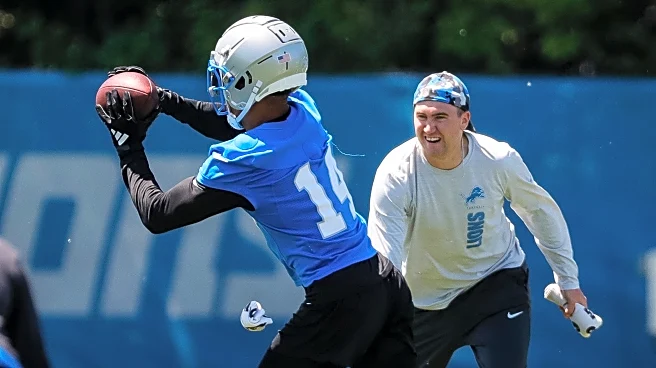What's Happening?
The speech and language therapy team in Guernsey is focusing on tools that assist children with speech difficulties. Currently, the team supports approximately 46 children across the island, ranging from
preschool to school age, who utilize Augmentative and Alternative Communication (AAC) tools. These tools include signs, boards, and various devices designed to aid communication. In celebration of AAC Awareness Month, the team is hosting events such as story sessions at the Guernsey Library on October 25 and November 1. Fiona Black, a senior speech and language therapist, emphasized the importance of high-tech aids, sign language, and everyday objects like photo albums in helping individuals with communication challenges interact with others. Additionally, a drop-in session is scheduled at Beau Sejour on October 29 for those interested in learning more about these tools.
Why It's Important?
The initiative by Guernsey's speech and language therapy team is significant as it addresses the communication needs of children with speech difficulties, providing them with essential tools to interact effectively. This focus on AAC tools highlights the importance of inclusive communication strategies that cater to diverse needs, ensuring that children with speech challenges are not left behind. By raising awareness and offering educational sessions, the team is fostering a supportive environment for families and educators, which can lead to improved communication skills and social integration for affected children. The broader impact includes potential advancements in educational practices and increased accessibility to communication aids, benefiting the community as a whole.
What's Next?
The upcoming events, including story sessions and the drop-in session at Beau Sejour, are expected to further engage families and educators, providing them with valuable insights into AAC tools. These sessions may lead to increased adoption of communication aids in schools and homes, enhancing the support network for children with speech difficulties. As awareness grows, there could be further developments in the availability and sophistication of AAC tools, driven by feedback from these community interactions. Stakeholders such as educators, healthcare providers, and policymakers might consider integrating these tools more comprehensively into educational and therapeutic programs.
Beyond the Headlines
The focus on AAC tools in Guernsey also touches on broader ethical and cultural dimensions, such as the importance of inclusivity and equal access to communication resources. By spotlighting these tools, the initiative challenges societal norms around communication and disability, promoting a culture of understanding and acceptance. Long-term, this could lead to shifts in how communication disabilities are perceived and addressed, potentially influencing policy changes and encouraging technological innovation in the field of speech therapy.










